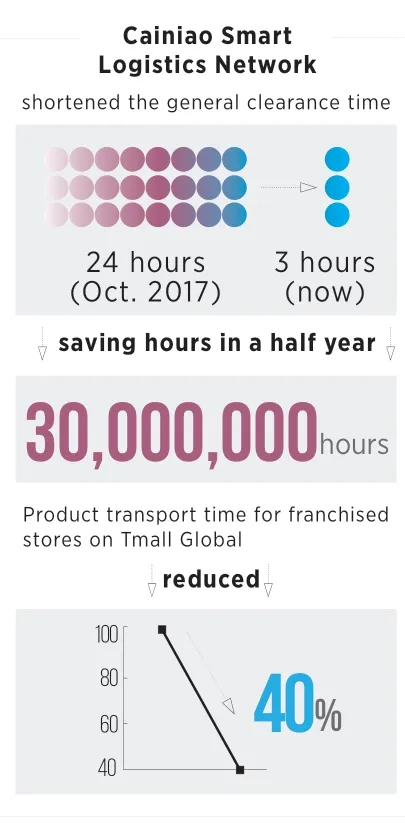MALAYSIA MEETS ALIBABA
By Wang Fang

Malaysian Prime Minister Mahathir Mohamad joins Alibaba Chairman Jack Ma as he takes a selfie with guests attending the China Entrepreneur Club Leaders Forum on August 19, 2018.
The Chinese e-commerce giant’s continued expansion in Malaysia is poised to accelerate the country’s digital economy transformation“Globaltradehasbeendominatedby60,000large corporations in past decades,”remarked Jack Ma, founder and executive chairman of e-commerce conglomerate Alibaba.“However, globalization should be made more inclusive, and we are now working to help 16 million or even 60 million small businesses around the world participate in globalization.”On his plans for an Alibaba Malaysia office, Ma revealed that the primary mission of the office is to help Malaysian small and medium-sized enterprises (SMEs) benefit from globalization while bolstering the country's transition to a digital economy.
Last June, Alibaba's Malaysia office in Kuala Lumpur opened, marking a new step in the tech group's long presence in the Southeast Asian country that has played a vital role in Alibaba's global expansion. Malaysian Prime Minister Mahathir Mohamad announced that he welcomes assistance from Chinese companies including Alibaba to boost development of the Malaysian economy with hopes of learning from China's internet technologies and globalization.
Integrating SMEs into Global Trade
“The best thing dot-coms can do is fuel the growth of small businesses,” Ma once asserted.
In 2017, Alibaba launched its first electronic world trade platform (eWTP) outside of China in Malaysia, aiming to help local SMEs participate in global trade. The initiative introduced a slew of measures such as establishment of the company's first overseas pilot zone, Malaysia's Digital Free Trade Zone (DFTZ), construction of its first eHub outside of China and eあorts to better serve Malaysian SMEs and young entrepreneurs by establishing digital infrastructure facilities and innovating logistics, payment and customs clearance.
Over the past two years, the digital infrastructure provided by Alibaba in Malaysia has gradually changed the fate of local SMEs. PT Swift Marketing Sdn Bhd (PTSM), a Malaysian bird's nest corporation, is one example. Thanks to the launch of a new system for faster customs clearance between China and Malaysia, the company's turnover on Tmall Global (Alibaba's cross-border e-commerce platform) has skyrocketed from US$3 million to US$14.9 million within only a year.
“Seventy percent of our new orders have been from Tmall Global over the year since we joined the platform,” revealed Adrian Yoong, marketing director of TRL (South East Asia) Sdn Bhd.His company is a producer and exporter of Malaysian tropical fruits, represented by Musang King durians. Because exporting durians requires strict logistics, their products were formerly only sold in domestic markets and depended heavily on trade fairs and door-to-door marketing. “The convenient services brought by Alibaba's platform such as online quotes, trading and customs clearance have made our dream of selling Malaysian durians to every corner of the world a reality after a few taps on a smartphone,” he added.
Since its launch in October 2017, Cainiao Smart Logistics Network under the Alibaba umbrella has shortened the general clearance time from one day to three hours,saving 30 million hours for Malaysian SMEs in only a half year. Product transport time for franchised stores on Tmall Global has been reduced by 40 percent on average.
With the expansion of the eWTP,Malaysian SMEs are establishing a stronger presence in the global market. Musang King durians, bird's nests, coあee and other Malaysian products are gaining increasing popularity among young Chinese consumers. “We hope that over the next five years, at least 50 percent of Malaysian companies will engage in e-commerce and the number of cross-border e-commerce firms will surpass 50,000,” said Dato' Ng Wan Peng, chief operating officer (COO) of Malaysia Digital Economy Corporation.
Chinese Experience in Digital Economics
“The digital economy is developing at an incredible pace worldwide,” declared Darell Leiking, Minister of International Trade and Industry of Malaysia, during a visit to the eastern Chinese city of Hangzhou in March. “eWTP is conducive to propelling Malaysia's implementation of the National eCommerce Strategic Roadmap, crossborder e-commerce in particular, so we enthusiastically support it.”
Malaysia rose among the top countries in Southeast Asia in economic development in the late 20th Century, and today is endeavoring to maintain its leading regional position in the face of the surging tide of the internet-driven digital economy. Just two months after the opening of Alibaba's Malaysia office, the 93-year-old Malaysian prime minister paid a visit to China, and his first stop was Alibaba Headquarters in Hangzhou. He reiterated support for joint construction of DFTZ between Alibaba and Malaysia, noting that he hopes Alibaba's digitalization experience will be shared to propel Malaysia's economic development.


This March marked the second anniversary of the launch of eWTP in Malaysia. The country sent a 30-member delegation of senior government officials to visit Alibaba Headquarters to gather details about its experience in digital economics to accelerate the digital transformation of the Malaysian economy. “Digital trade is shaping the future,” opined Darell Leiking.“Not only can the eWTP help us develop storage and logistics networks, but this new trading model will create more vitality and opportunities for Malaysia.”In Malaysia, alongside constructing digital infrastructure such as logistics facilities and payment systems, Alibaba has also attached importance to talent training. In collaboration with local governments, specialized agencies and universities, Alibaba Business College has provided training on digitalization for more than 15,000 e-commerce practitioners,entrepreneurs and other related professionals so far.
While promoting eWTP construction,Alibaba has introduced big data centers,inclusive services, mobile payments and cloud computing to Malaysia to kindle the country's digital transformation. Alibaba Cloud (Aliyun) has established two data centers in Malaysia alongside talent incubators constructed with local partners.Ant Financial, the finance arm of Alibaba,has brought inclusive financial services to Malaysia. Alibaba's digital wallet Alipay is increasingly accepted in Malaysia, available at tens of thousands of duty-free retailers and convenience stores across the country.And Aliyun's ET City Brain has been adopted in Kuala Lumpur as a smart platform to ease the city's traffic congestion.

Adrian Yoong, marketing director of TRL (South East Asia) Sdn Bhd, sold nearly US$14.9 million worth of durians around the world in just a year thanks to the e-marketplace of Alibaba.
